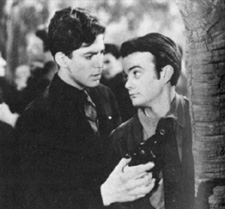On This Day in History, February 11: Leader of the Dead End Kids

Billy Halop was born in Brooklyn on Feb. 11, 1921, the son of an attorney for the Brooklyn-based Trunz Meat Packing firm. His mother was a dancer and his sister Florence was to become a radio and TV actress.
At 12 years old he was already an established child star. He was a dark, curly-haired, handsome lad. He played Romeo in a radio version of the Shakespearean drama. He later was on several radio serials; one in which he played a young Western hero “Bobby Benson.” He also appeared with Col. W.T. Johnson’s Rodeo at Madison Square Garden.
When a casting call went out for Broadway’s melodrama “Dead End” in 1935, he was immediately chosen for the role of the young Dead End Kids gang leader Tommy. After the Broadway run, the Dead End Boys went to Hollywood for the film version of the play. Warners made use of the boys in six sequels from 1937 to 1939.